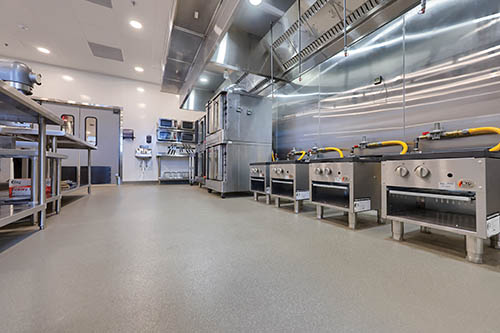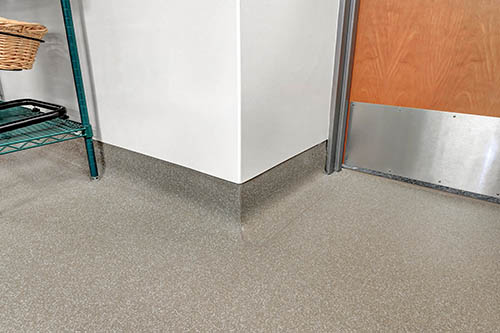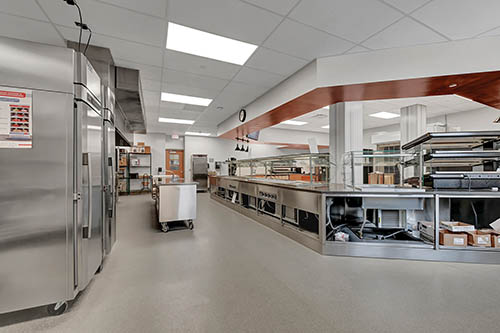— By Kevin Bourassa —
Mitigating risk in retail & restaurant facilities.
In the retail and restaurant industry, risk management is essential. From bustling kitchens to high-traffic customer areas, slips and falls pose a serious threat to both employees and guests. The right flooring can significantly reduce these risks, ensuring a safer environment while protecting your business from potential liabilities.

Slips, trips and falls account for 30% of all reported injuries in North America and are the leading cause of workplace accidents in restaurants, hotels and public buildings, according to Liberty Mutual’s 2024 Workplace Safety Index. In customer-facing spaces, a single incident can result in lawsuits, negative reviews and lost business. Investing in slip-resistant flooring is a proactive step toward mitigating these risks.
Regulatory bodies like the Occupational Safety and Health Administration (OSHA) and the Americans with Disabilities Act (ADA) have clear guidelines on workplace safety and accessibility. OSHA mandates that floors be kept clean and dry “as far as possible” to reduce hazards, while the ADA requires flooring to meet slip-resistance standards to ensure accessibility for all guests. Compliance is critical, as failure to meet these requirements can result in costly fines, legal action and potential shutdowns. Choosing flooring that exceeds industry safety benchmarks, such as those with a slip resistance rating greater than or equal to R12, helps businesses stay compliant and avoid costly penalties.

Different zones within a retail or restaurant facility require tailored safety solutions. Back-of-house areas such as commercial kitchens and food prep spaces are particularly hazardous due to grease, spills and airborne contaminants. Slip-resistant flooring with nonporous, seamless surfaces minimizes bacterial growth while ensuring maximum traction.
Front-of-house areas, including entryways, dining spaces and restrooms, face high foot traffic and exposure to moisture from spills or inclement weather. Durable, slip-resistant surfaces ensure a safe experience for both employees and customers. Stock rooms and loading areas must withstand heavy equipment and foot traffic while maintaining safety and durability.

Even the best flooring needs proper maintenance to maintain its effectiveness. Regular cleaning, the use of appropriate cleaning agents and employee training on hazard identification are essential. Seamless flooring with watertight transitions, such as flash coving, prevents dirt and moisture buildup, reducing contamination risks and simplifying maintenance. Additionally, periodic slip-resistance testing, such as pendulum testing and dynamic coefficient of friction assessments, ensures flooring continues to perform under real-world conditions.
Every slip-and-fall incident puts your business at risk. Beyond the immediate financial costs, reputational damage from negative customer experiences can be long-lasting. Investing in purpose-built flooring solutions not only mitigates risk but also demonstrates a commitment to safety, enhancing trust among employees and customers alike. A safer facility is a more efficient and profitable one. By choosing the right flooring, you’re taking a critical step in risk management by protecting your people, your business and your bottom line.
— Kevin Bourassa is the hospitality segment manager for Altro. Family-owned and operated since 1919, Altro is a manufacturer and innovator in commercial floors and walls. With over 60 years’ experience in delivering floors and walls for commercial kitchens, Altro offers expertise to foodservice architects, designers, contractors and end users. For more information, visit www.altro.com/kitchens or email [email protected].

